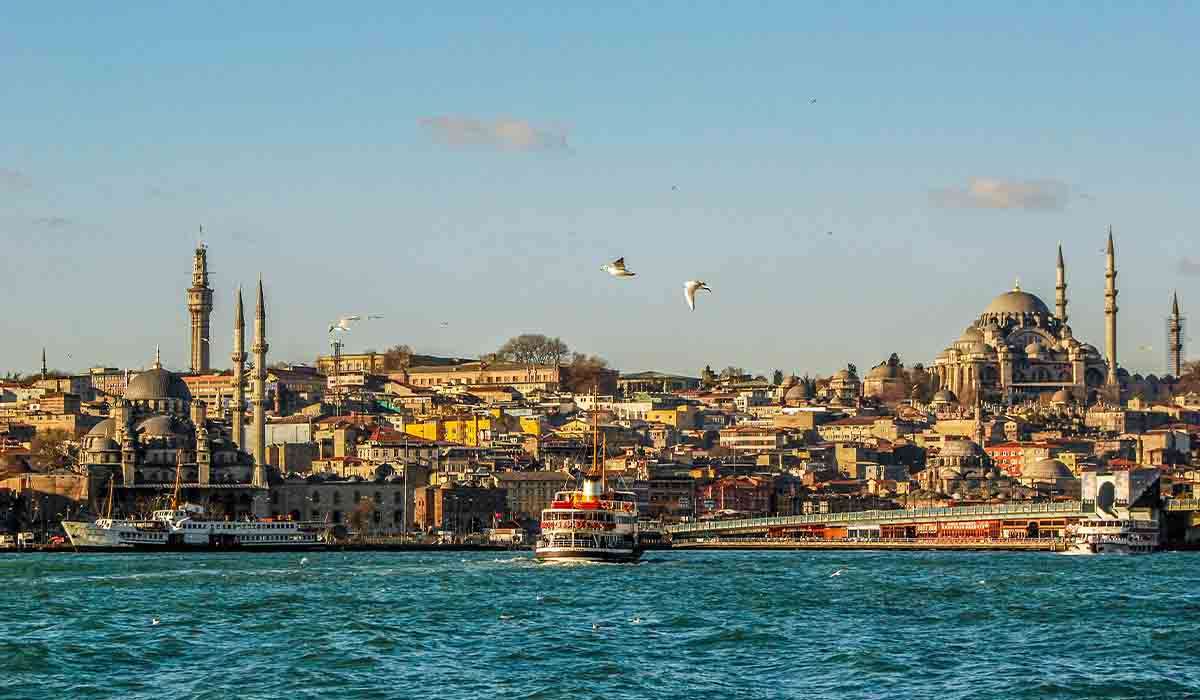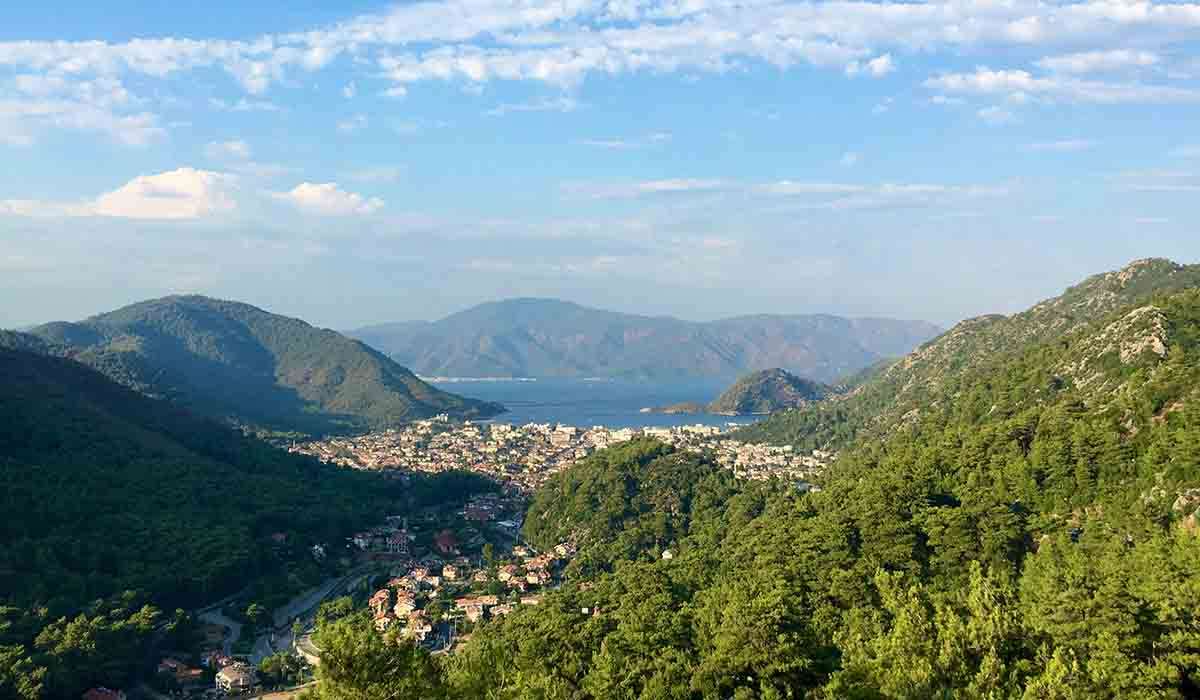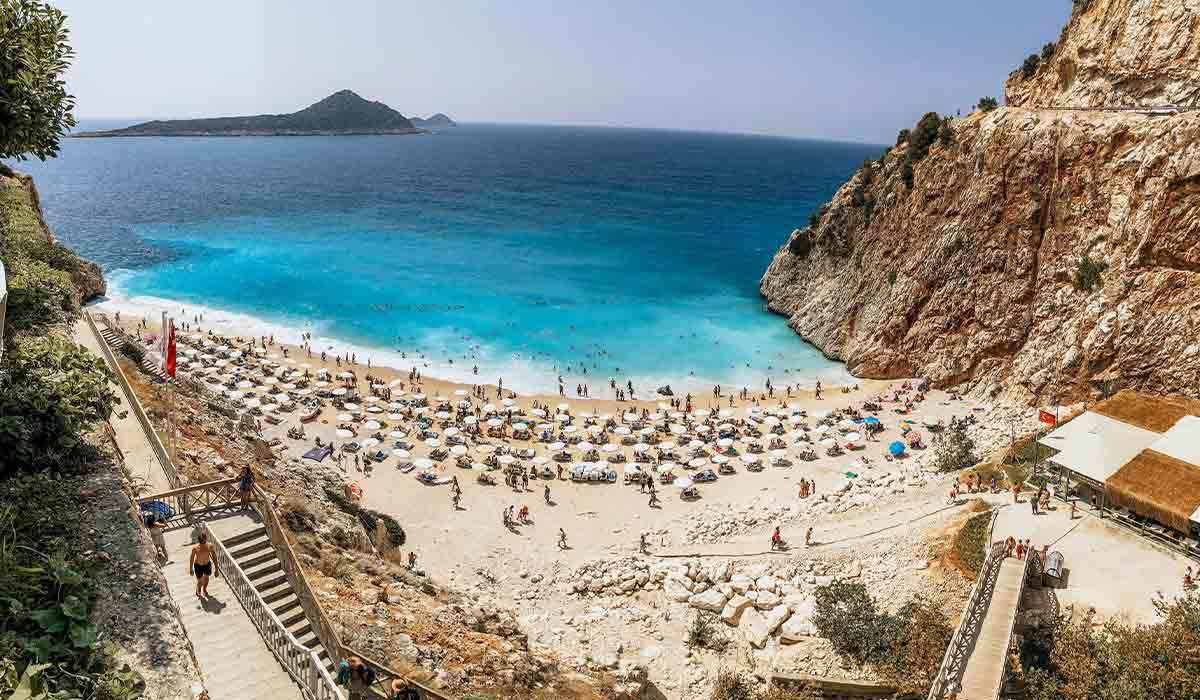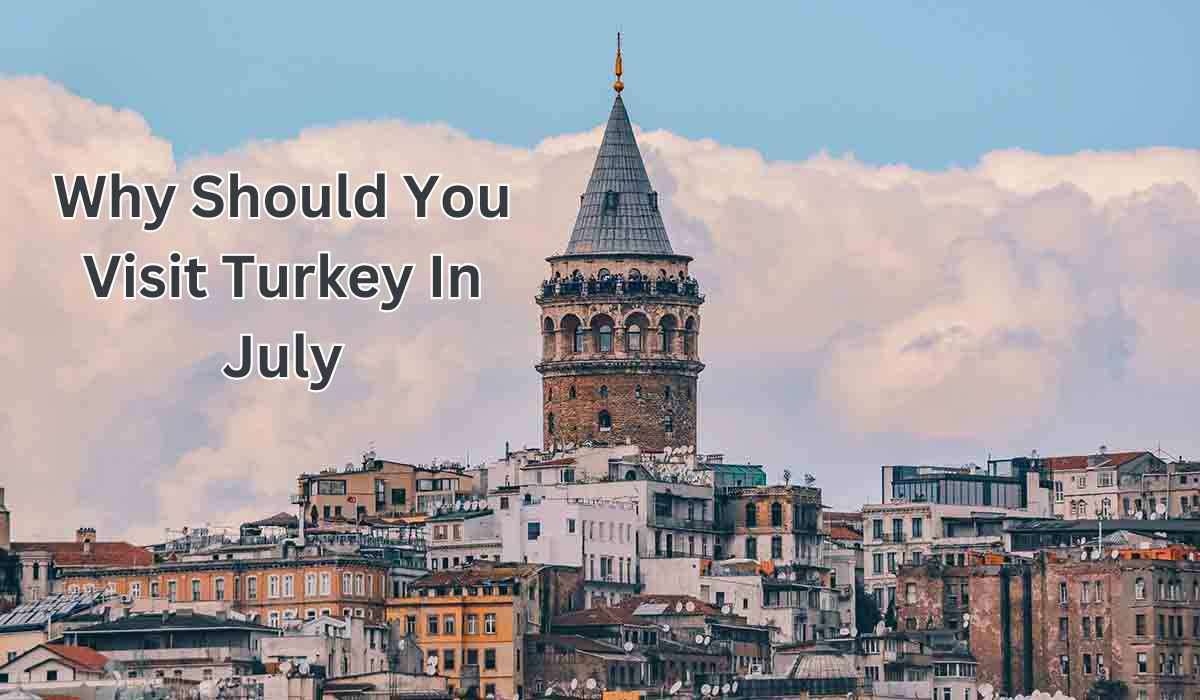Exploring the Vibrant Beauty of Turkey in July: A Travel Guide
Contents
- 1 Exploring the Vibrant Beauty of Turkey in July: A Travel Guide
- 1.1 Must-Visit Places in Turkey in July
- 1.1.1 1. Istanbul: The Crossroads of Civilizations Turkey in July
- 1.1.2 2. Bodrum: A Symphony of Sun, Sea, and History Turkey in July
- 1.1.3 3. Side: Where Ancient Ruins Meet Sandy Shores Turkey in July
- 1.1.4 4. Marmaris: The Riviera’s Vibrant Heart Turkey in July
- 1.1.5 5. Antalya: A Mediterranean Masterpiece Turkey in July
- 1.1.6 Activities to Experience in Turkey in July

Turkey in July: Sun, Sea, and Ancient Cities
July in Turkey is synonymous with warm, sunny days that beckon beach lovers and adventurers alike. With daytime temperatures soaring between 25 to 30 degrees Celsius and cooler nights around 20-22 degrees Celsius, the climate is perfect for those looking to bask in the sun or cool off in the inviting waters of the Mediterranean and Aegean Seas, boasting an ideal water temperature of 28 degrees. To navigate the heat comfortably, packing essentials such as sunscreen, sunglasses, a wide-brimmed hat, and light clothing is advisable.
Reasons to Visit Turkey in July

Turkey in July: Sun, Sea, and Ancient Cities
Turkey’s allure in July is undeniable, from the warmth of its people to the competitive pricing of accommodations and attractions due to the off-peak season. The seas are invitingly warm, making beach days a must. Additionally, Turkey’s vibrant festival scene, including the renowned Istanbul International Jazz Festival, offers a unique cultural immersion through music and art, highlighting the country’s rich cultural tapestry.
Must-Visit Places in Turkey in July
1. Istanbul: The Crossroads of Civilizations Turkey in July

Turkey in July: Sun, Sea, and Ancient Cities
Istanbul, a city that epitomizes the confluence of two continents, Europe and Asia, stands as a beacon of history, culture, and architectural grandeur. This city, which has served as the capital of both the Byzantine and Ottoman Empires, is a living museum that offers a seamless blend of the past and present.
Historical Significance
The historical significance of Istanbul is monumental, evident in its ancient walls that whisper stories of sieges and empires. The Hagia Sophia, with its magnificent dome, serves as a testament to Byzantine engineering and remains one of the most profound symbols of Christian and Islamic fusion. The Blue Mosque, renowned for its striking blue tiles and serene ambiance, continues to function as a place of worship, drawing both pilgrims and tourists. The Topkapi Palace, once the heart of the Ottoman Empire, offers a glimpse into the opulent lifestyle of the sultans with its lavish courts and sacred relics.
Cultural Melting Pot
Istanbul’s strategic location has made it a cultural melting pot. The Grand Bazaar and Spice Market are bustling mazes of commerce, offering everything from exquisite hand-woven carpets to fragrant spices and intricate jewelry. The city’s culinary landscape is a reflection of its diverse heritage, with delicacies ranging from savory kebabs to sweet baklava, each telling a story of convergence and tradition.
Architectural Marvels
Beyond its historical and cultural significance, Istanbul’s architectural landscape is a marvel. The city’s skyline is a mosaic of minarets and domes, with the Bosphorus Strait providing a natural divide between two continents. The Galata Tower offers panoramic views of this sprawling metropolis, showcasing the blend of ancient structures and modern skyscrapers.
Living Legacy
Istanbul is not just a city; it’s a living legacy of the human endeavor to create, conquer, and coexist. Walking through its streets is like traversing through time, with each corner unveiling a piece of history. From the serene beauty of the Hagia Sophia to the vibrant energy of Taksim Square, Istanbul embodies the spirit of diversity and resilience.
Conclusion
Visiting Istanbul is more than a journey; it’s an experience that etches itself into the heart and mind. It’s a city where history is not just remembered; it’s palpable, in the air you breathe, in the stones you tread, and in the vistas that capture the soul. Istanbul is a testament to the enduring allure of civilization, a treasure trove of human heritage that continues to inspire and awe.
2. Bodrum: A Symphony of Sun, Sea, and History Turkey in July

Turkey in July: Sun, Sea, and Ancient Cities
Nestled on the southwest coast of Turkey, Bodrum is a picturesque blend of ancient charm and modern luxury, making it an unmissable stop for travelers. Once known as Halicarnassus, the city’s rich history is as clear as the turquoise waters that embrace its shores.
Ancient Wonders and Modern Delights
The legacy of Bodrum is crowned by the ruins of the Mausoleum at Halicarnassus, one of the Seven Wonders of the Ancient World. Though only the foundations remain today, the site still inspires awe, echoing the grandeur of ancient civilizations. The Bodrum Castle, also known as the Castle of St. Peter, stands as a sentinel over the city’s marina, housing the Museum of Underwater Archaeology and offering insights into the region’s rich maritime history.
Bodrum’s charm extends beyond its historical sites. The city is renowned for its vibrant nightlife, with a plethora of bars, clubs, and cafes that come alive as the sun sets. The marina is lined with luxurious yachts, and the streets are filled with boutiques selling everything from traditional crafts to high-end fashion.
Turquoise Beaches and Seaside Serenity
The Bodrum Peninsula is dotted with beautiful beaches and hidden coves, accessible by boat tours that provide a unique perspective of the Aegean coast. Gumbet and Bitez beaches are popular for their water sports, offering windsurfing, parasailing, and jet skiing. For those seeking tranquility, the secluded bays around the peninsula offer serene spots to relax and soak in the Mediterranean sun.
Culinary Journey
Bodrum’s culinary scene is a delightful exploration of Turkish cuisine, with an emphasis on fresh seafood and Aegean specialties. The waterfront restaurants serve dishes that are as captivating as the view, from grilled octopus to Aegean herbs. The local markets are a food lover’s dream, offering the freshest ingredients and the opportunity to taste local delicacies like stuffed mussels and Turkish delight.
A Cultural Melange
Bodrum’s cultural calendar is bustling with festivals and events, particularly in July. The Bodrum Ballet Festival and the International Bodrum Dance Festival showcase a blend of traditional and contemporary performances, drawing artists and audiences from around the world.
Conclusion
Bodrum is a mosaic of ancient history, natural beauty, and cultural richness. It’s a place where every sunset paints a new masterpiece, and the azure waters of the Aegean beckon with the promise of adventure. Whether you’re exploring ancient ruins, dancing the night away, or simply lounging on a beach, Bodrum offers an escape into the extraordinary, making it a quintessential part of any Turkish voyage.
3. Side: Where Ancient Ruins Meet Sandy Shores Turkey in July

Turkey in July: Sun, Sea, and Ancient Cities
Side, a coastal town in Antalya Province, is a unique blend of Greco-Roman history and picturesque Mediterranean beauty. This ancient city, pronounced “See-day,” offers a journey back in time, complemented by stunning beaches and a vibrant contemporary life.
A Stroll Through History
The heart of Side is its extensive archaeological site. The grandeur of the ancient city is most evident in the well-preserved amphitheater, capable of seating 15,000 spectators, and the Temple of Apollo, where towering columns frame the setting sun, creating one of Turkey’s most iconic vistas. Wandering through the remnants of Roman baths, agora, and city walls offers a tangible connection to the past, making Side a living museum.
Coastal Charm
Beyond its historical riches, Side’s long, sandy beaches are a haven for sun-seekers. The East Beach and West Beach offer a variety of water sports, from parasailing to jet skiing, while also providing quieter spots for those wishing to unwind by the sea. The clear, warm waters of the Mediterranean are perfect for swimming, snorkeling, and diving, with numerous underwater sites to explore.
Old Town Delights
The narrow streets of Side’s Old Town are a delight to explore. Lined with stone houses, boutiques, and cafes, this area retains a charmingly laid-back atmosphere. As evening falls, the town comes alive with an array of dining options, offering everything from traditional Turkish meals to international cuisine. The harbor area, with its lineup of restaurants and bars, is the perfect place to enjoy a meal with a view, overlooking the picturesque boats and the ancient ruins.
Cultural Fusion
Side seamlessly blends its ancient heritage with a lively modern culture. The town’s amphitheater hosts a variety of events throughout the summer, including concerts, ballets, and festivals, allowing visitors to enjoy contemporary performances in a historic setting. The Side Museum, housed in the former Roman baths, displays artifacts from the town’s history, providing context to the ruins that dot the landscape.
Conclusion
Side is a destination that offers more than just a beach holiday or a historical excursion; it’s a place where both coexist harmoniously. The town’s unique combination of ancient ruins, beautiful beaches, and lively cultural scene makes it an indispensable stop for anyone visiting Turkey in July. Whether you’re exploring the remnants of a bygone era, basking in the Mediterranean sun, or enjoying the local cuisine, Side promises an unforgettable experience that bridges the gap between the past and the present.
4. Marmaris: The Riviera’s Vibrant Heart Turkey in July

Turkey in July: Sun, Sea, and Ancient Cities
Marmaris, nestled at the meeting point of the Aegean and Mediterranean seas, is renowned for its lush pine-clad mountains, stunning coves, and energetic nightlife. This seaside town combines natural beauty with a lively atmosphere, making it a favorite among both adventurers and those seeking relaxation.
Natural Beauty and Adventure
Marmaris is surrounded by a dramatic landscape that invites exploration. The town serves as a gateway to the Datça Peninsula and the renowned Cleopatra Island, where legend has it that the sands were brought from Egypt for Cleopatra herself. The surrounding pine forests offer hiking and biking trails with breathtaking views, while the clear, calm waters are ideal for sailing, diving, and water sports. The Marmaris National Park, a natural haven, provides a serene escape with its untouched beauty and wildlife.
A Harbor of History and Leisure
The Marmaris Castle, dating back to the 16th century, overlooks the harbor and offers a glimpse into the town’s storied past, including a stint under Ottoman rule. Today, the castle houses a museum with artifacts that trace the region’s history. The harbor and promenade are the heartbeats of Marmaris, lined with luxury yachts, traditional gulets, and bustling cafes and bars. The vibrant marina is a starting point for numerous boat tours that explore the nearby bays and islands.
Nightlife and Culinary Delights
Marmaris is famous for its dynamic nightlife, with a plethora of clubs, bars, and beach parties that cater to every taste and age group. The town’s culinary scene is equally vibrant, offering a mix of traditional Turkish cuisine and international dishes. Seafood restaurants by the sea serve freshly caught delights, while kebab houses and meyhanes (Turkish taverns) offer an authentic taste of Turkish hospitality and flavors.
Shopper’s Paradise
Shopping in Marmaris is an adventure in its own right. The Grand Bazaar and Carsi Market are bustling with shops selling everything from spices and sweets to handmade carpets and jewelry. It’s a place where haggling is part of the experience, offering visitors a chance to immerse themselves in the local culture and bring home unique souvenirs.
Conclusion
Marmaris is a microcosm of all that makes the Turkish Riviera enchanting: stunning natural landscapes, historical depth, culinary richness, and a pulsating energy that lasts from dawn till dusk. Whether you’re sailing on its turquoise waters, exploring ancient ruins, or dancing the night away, Marmaris promises a diverse and fulfilling holiday experience, making it an indispensable destination for anyone visiting Turkey in July.
5. Antalya: A Mediterranean Masterpiece Turkey in July

Turkey in July: Sun, Sea, and Ancient Cities
Antalya, the largest city on the Turkish Mediterranean coast, is a symphony of sun-soaked beaches, towering mountains, and ancient cities. Known as the Turquoise Coast for its dazzling blue waters, Antalya offers a slice of paradise with a backdrop of spectacular landscapes and a rich tapestry of history.
Ancient Cities and Timeless Ruins
The region around Antalya is sprinkled with ancient ruins, each telling tales of civilizations that thrived here millennia ago. The city itself hosts the charming old town of Kaleiçi, where narrow cobbled streets wind past Ottoman-era houses, leading to the ancient Roman harbor. Nearby, the towering ruins of Perge and Aspendos offer glimpses into the past, with Aspendos’s amphitheater being one of the best-preserved Roman theaters in the world.
Natural Wonders
Antalya’s natural attractions are as varied as they are breathtaking. The Düden Waterfalls, both the Upper and Lower falls, offer stunning vistas, especially the latter, which cascades directly into the Mediterranean Sea. The Taurus Mountains frame the city, offering hiking and adventure sports opportunities, while the Karain Cave, one of Turkey’s oldest inhabited sites, provides a fascinating excursion for history buffs.
Beaches and Leisure
The beaches in Antalya are amongst Turkey’s finest, with Konyaaltı and Lara Beach being the most prominent. These beaches boast crystal-clear waters and offer numerous recreational activities, from parasailing to jet skiing. Beyond the beaches, Antalya’s luxury resorts and spas provide the ultimate relaxation experience, with traditional Turkish baths and massages.
Culinary Delights
Antalya’s cuisine is a reflection of its rich cultural heritage, offering a blend of Mediterranean and Anatolian flavors. Fresh seafood, grilled meats, and an array of mezze platters are staples here. The city’s dining scene ranges from traditional Turkish eateries to international restaurants, all promising an unforgettable culinary journey.
Cultural Festivals and Art
July in Antalya is vibrant with cultural festivals, including the International Antalya Film Festival, which attracts cinephiles and industry professionals from around the globe. The Antalya Golden Orange Film Festival, another highlight, showcases Turkish and international films. The city’s galleries and museums, like the Antalya Museum, offer insights into the region’s rich history and artistic heritage.
Activities to Experience in Turkey in July
- Explore the Suleymaniye Mosque: Experience the spiritual tranquility and architectural grandeur of this 16th-century masterpiece.
- Shop at the Grand Bazaar: Dive into the world’s one of the oldest and largest covered markets, offering everything from traditional crafts to spices.
- Admire the Hagia Sophia: Marvel at the architectural wonder that has stood as a symbol of Byzantine and Ottoman heritage.
- Discover the Bodrum Museum of Underwater Archaeology: Unveil the mysteries of the deep with artifacts recovered from the Aegean Sea.
- Visit the Antalya Aquarium: Enjoy a family-friendly adventure in one of the world’s largest aquariums, featuring an impressive tunnel aquarium.

























